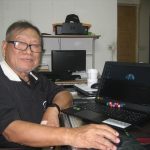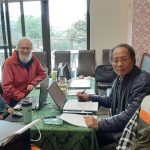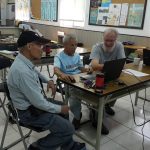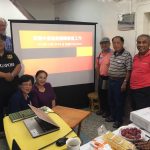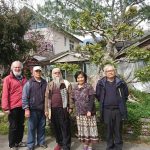As this difficult and unsettling year 2020 draws to a close, I thank God for graciously enabling me to support the ongoing work of Bible translation in Taiwan. Originally I had planned to visit my coworkers four times this year, but with travel restrictions due to the pandemic, I could only visit them once, from late January to early March. In accord with guidelines from the government of Canada, the PCC banned all international travel due to the COVID-19 pandemic. The irony in my case is that it is actually safer to live in Taiwan, a nation of 23 million people which is still unjustly barred from the World Health Organization and the United Nations.
As I write these words in the final week of 2020, the Taiwan Center for Disease Control reports that since the start of the Corona Virus outbreak a year ago, in total Taiwan has had under 800 confirmed cases and 7 deaths. Compare this with Canada which has had over 550,000 confirmed cases and 15,000 deaths. The world can learn from Taiwan’s efforts to save and protect human lives. The PCC has expressed its deep thanks to the Presbyterian Church in Taiwan for sending masks and personal protective equipment to Canada which have been used in Cobourg, Owen Sound, the Anamiewigummig Fellowship Centre in Kenora and at Evangel Hall in downtown Toronto.
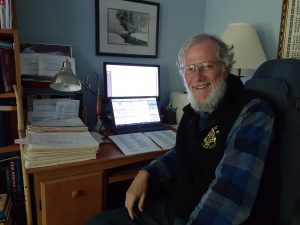
Checking indigenous Bible translations with coworkers over the internet.
Due to the pandemic, I had to work from home in Toronto most of the year. The Bible Society in Taiwan and I first had to teach at least one person on each of the 11 teams I now serve how to use Skype to communicate better from opposite sides of the planet. Skype’s screen-share technology lets me see a coworker’s desktop in real time as though I were sitting right beside them. When we each open Paratext, the United Bible Societies’ professional translation software, my coworker sees it on their computer while I can see their copy of Paratext plus my own on the two screens I use. Together we can then perform important checking procedures on the team’s current translation.
Because Toronto is now 13 hours behind Taiwan, I typically have 3-hour-long checking sessions with different team leaders during my early mornings and late evenings. Afternoons while they are asleep, I can check translations on my own, plus go for a walk in the neighbourhood practising proper pandemic protocols.
- Rev. Manias Istasipal lead Bunun translator.
- Rev. Watan Yawi (left) and Tayal Bible translators.
Lead translators Rev. Manias Istasipal of the Bunun team and Rev. Watan Yawi of the Tayal team and I have nearly completed all the final checking for their translations of the complete Bible into Bunun and Tayal. It takes a long time of careful concentrated reading and analysis to ensure that names and key biblical terms in Hebrew, Aramaic and Greek in semantic domains such as people, plants, animals, objects, rituals and attributes, have all been translated correctly and consistently into each indigenous language. We also need to ensure that parallel passages have been translated accurately; for example, the 10 Commandments in Exodus 20 and Deuteronomy 5, the sayings of Jesus in the four Gospels, as well as New Testament quotations from the Old Testament. We hope to finalize the Bunun and Tayal translations early in 2021, move to the typesetting and final proofreading stage, then publish both Bibles later in 2021.
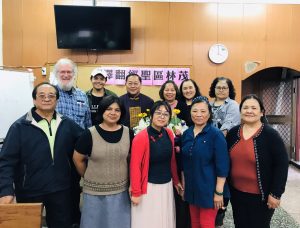
Maolin, Tona and Wanshan Bible translators.
Using Skype and Paratext I have also been helping coworkers from three dialects of Ngudradrekai check and adjust their translations of the Gospel of Mark into Maolin, Tona and Wanshan. Although these three small dialect groups only have about 500 speakers each, people are eager to have even a small portion of the Bible in their own mother tongue. Each of these teams has enjoyed the benefits of consulting the Bible in the larger Wutai dialect of Ngudradrekai which we published in 2017. Early in 2021 we hope to publish a 4-column edition of Mark’s Gospel with these three Ngudradrekai dialects plus Today’s Chinese Version (2019) in parallel.
Members of the Pinuyumayan team have been doing a second careful review of their translation of the New Testament. After all the Paratext checking is done, we can send the text to the BSTWN for typesetting, hopefully in the summer of 2021.
- Pinuyumayan Bible translators.
- Paiwan Bible translation team.
- Tsou (Cou) Bible translators.
The Paiwan and Tsou (Cou) teams have been sending me regular updates of their translations of Old Testament books. We communicate by Skype or by a Chinese character texting app called LINE whenever we need to discuss translation issues in greater detail. As with my other teams, the friendships and strong working relationships we have built through many in-person meetings over the past eight years or more provide a solid basis for good communication, productive work and ongoing support.
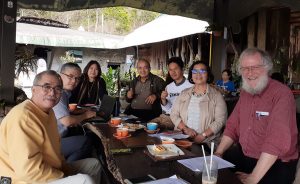
Tao translator Rev. Syan Mahaliloya (3rd from rt.) and the PCT’s Indigenous Bible Translation Committee
Last February when I was in Taiwan, I “happened” to meet Rev. Syan Mahaliloya for the first time at a meeting of the PCT’s Indigenous Bible Translation Committee. He is a young Tao (Yami) pastor who lives on Lanyu (Orchid Island) off the south-east coast of Taiwan. The BSTWN published the first ever Tao New Testament in 1994 for the 4,500 Tao people. The Tao team is eager to translate the Old Testament too, but before that, we need to make some small revisions to their NT. This new project presented us with a unique challenge—how to work remotely during a pandemic with a brand new team? By God’s grace, using Skype over the past few months, I have been able to teach Rev. Syan enough skills for him to use Paratext effectively. Thankfully, he has learned the basics quickly, but he and the team have a long way to go to revise the NT then translate the OT. When he and I open and close our weekly Skype sessions in prayer, we praise God for the presence of the Holy Spirit and the ability to communicate clearly over 12,000 kilometres apart—me in my study in Toronto, Rev. Syan in his home on a small wind-swept volcanic island in the Pacific Ocean.
Thank you for praying and supporting each of these ongoing Bible translation projects. We pray that 2021 will be a great year of more translating, revising, typesetting and publishing, so that all the indigenous peoples in Taiwan can read the whole Bible in their own beautiful ancestral languages.


